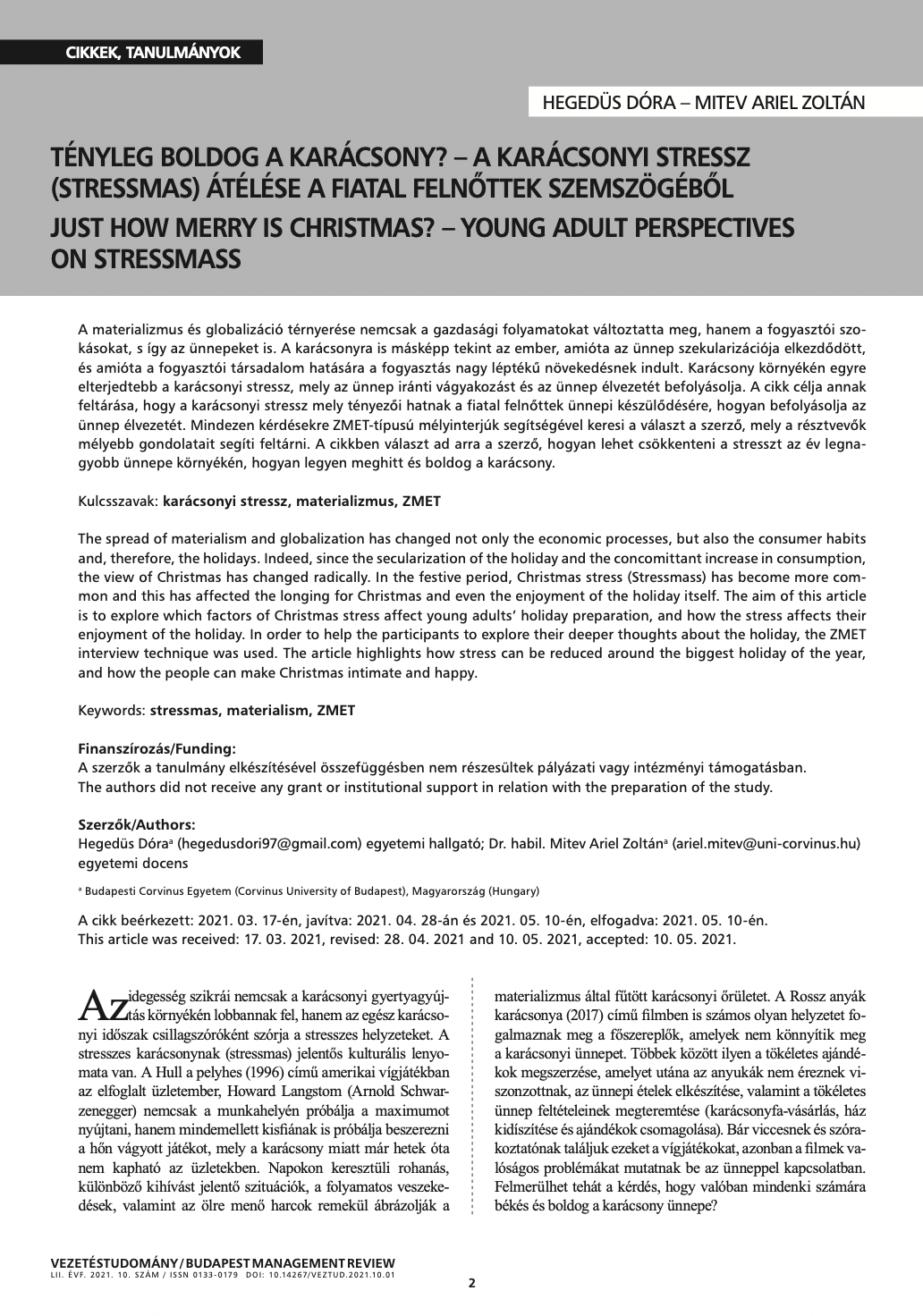Tényleg boldog a karácsony?
A karácsonyi stressz (stressmas) átélése a fiatal felnőttek szemszögéből
DOI:
https://doi.org/10.14267/VEZTUD.2021.10.01Keywords:
stressmas, materialism, ZMETAbstract
The spread of materialism and globalization has changed not only the economic processes, but also the consumer habits and, therefore, the holidays. Indeed, since the secularization of the holiday and the concomittant increase in consumption, the view of Christmas has changed radically. In the festive period, Christmas stress (Stressmass) has become more common and this has affected the longing for Christmas and even the enjoyment of the holiday itself. The aim of this article is to explore which factors of Christmas stress affect young adults’ holiday preparation, and how the stress affects their enjoyment of the holiday. In order to help the participants to explore their deeper thoughts about the holiday, the ZMET interview technique was used. The article highlights how stress can be reduced around the biggest holiday of the year, and how the people can make Christmas intimate and happy.
Downloads
References
Anghelcev, G., Chung, M.-Y., Sar, S. & Duff, B.R.L. (2015). A ZMET-based analysis of perceptions of climate change among young South Koreans: Implications for social marketing communication. Journal of Social Marketing, 5(1), 56-82. https://doi.org/10.1108/JSOCM-12-2012-0048
Atkinson, R., Atkinson, R., Smith, E., Bem, D., & Nolen- Hoeksema, S. (1999). Pszichológia. Budapest: Osiris Kiadó.
Bagdy E. (2007). Pszichofitnessz. Kacagás – kocogás – lazítás. Budapest: Animula Kiadó.
Beatty, S., Kahle, L., & Homer, P. (1991). Personal values and gift-giving behaviors: A study across cultures. Journal of Business Research, 22(2), 149-157. https://doi.org/10.1016/0148-2963(91)90049-4
Belk, R. (1977). Gift-giving behavior. Urbana: College of Commerce and Business Administration, University of Illinois at Urbana-Champaign.
Bell, B. S., & Kozlowski, W. J. (2002). Goal orientation and ability: Interactive effects on self-efficacy, performance, and knowledge. Journal of Applied Psychology, 87(3), 497–505. https://doi.org/10.1037/0021-9010.87.3.497
Brown, S., & Reid, R. (1997). Shoppers on the verge of a nervous breakdown. In Brown, S., & Reid, R. (Eds.). Consumer research: Postcards from the edge (pp.79-149). London: Routledge.
Buehler, R., & Griffin, D. (2003). Planning, personality, and prediction: The role of future focus in optimistic time predictions. Organizational Behavior and Human Decision Processes, 92(1-2), 80-90. https://doi.org/10.1016/S0749-5978(03)00089-X
Burnett, D. (2017). Festive stress: why the Christmas season can be anything but merry. The Guardian, 20. Dec. 2017. https://www.theguardian.com/science/brain-flapping/2017/dec/20/festive-stress-why-the-christmas-season-can-be-anything-but-merry
Chen, P.-J. (2008). Exploring unspoken words: using ZMET to depict family vacationer mental models. Advances in Hospitality and Leisure, 4. 29–51. https://doi.org10.1016/s1745-3542(08)00002-7
Dwyer, C. (2018). Stress at Christmas. https://www.psychologytoday.com/us/blog/thoughts-thinking/201812/stress-christmas
Elblinger, C., & Bernáth, L. (2013). Ünnep és családi identitás. Pszichológia, 33(1), 61-79. https://doi.org/10.1556/pszicho.33.2013.1.4
Felvi.hu (2018). EUROSTUDENT VI gyorsjelentés. https://www.felvi.hu/pub_bin/dload/felsooktatasimuhely/Eurostudent_VI_gyorsjelentes.pdf
Ferrari, J. (1993). Christmas and procrastination: Explaining lack of diligence at a “real-world” task deadline. Personality and Individual Differences, 14(1), 25-33. https://psycnet.apa.org/doi/10.1016/0191-8869(93)90171-X
Hancock, P., & Rehn, A. (2011). Organizing Christmas. Organization, 18(6), 737–745. https://doi.org/10.1177%2F1350508411428214
Hegedüs, D. (2020). Tényleg boldog a karácsony? Avagy mi okozza a stresszt az emberekben a szeretetünnep környékén? (TDK-dolgozat). Budapesti Corvinus Egyetem, Budapest.
Hidegh, A. L. (2019). Karácsony és szervezetek. In Primecz, H., Csillag, S., Toarniczky, A. & Kiss, Cs. (Eds.), Leadership, kultúra, szervezetek: tanulmányok Bakacsi Gyula tiszteletére (pp. 85-93). Budapest: Budapesti Corvinus Egyetem, Vezetéstudományi Intézet.
Horváth, D., & Mitev, A. (2015). Alternatív kvalitatív kutatási kézikönyv. Budapest: Alinea Kiadó.
Kahn, R.L. & Byosiere, P. (1992). Stress in organizations. In Dunnette, M. D. & Hough, L. M. (Eds.), Handbook of Industrial and Organizational Psychology (pp. 571-651). London: Rand McNally College.
Lemmergaard, J., & Muhr S. L. (2011). Regarding gifts 0 on Christmas gift exchange and asymmetrical business relations. Organization, 18(6), 763-777. https://doi.org/10.1177%2F1350508411416402
Marshall, A. (2017). Can Christmas music make you ill? https://www.bbc.co.uk/music/articles/2458d692-b9ee-4afe-b119-9caed3570396
Mayo Clinic. (2017). Tips for coping with holiday stress. https://www.mayoclinic.org/healthy-lifestyle/stress-management/in-depth/stress/art-20047544
McKechnie, S., & Tynan, C. (2006). Social meanings in Christmas consumption: an exploratory study of UK celebrants’ consumption rituals. Journal of Consumer Behaviour, 5(2), 130-144. https://doi.org/10.1002/cb.40
Meiring, J. (2020). The absence of presence. https://bodytheology.co.za/2020/04/07/the-absence-of-presence
Mitev, A., & Neulinger, Á. (2016). Sikeres és sikertelen rítustipológia a családi rítusok elemzésén keresztül. Vezetéstudomány, 47(7), 29-40. https://doi.org/10.14267/VEZTUD.2016.07.03
Neulinger, Á. (2013). Világi rítusok, családi rítusok. Szakirodalmi áttekintés. Szociológiai Szemle, 23(3), 102-120. https://szociologia.hu/dynamic/2013_03_102_120_oldal.pdf
Neulinger, Á., & Mitev, A. (2017). Fiatal felnőttek családi rítusai és a felnőtté válás jellemzői a családtól való leválás idején. Szociológiai Szemle, 27(1), 64-89. http://unipub.lib.uni-corvinus.hu/3023/1/SzocSzle2017n1p64.pdf
Paul, S. (2017). ‘Festive stress’ is ruining America’s holiday season. https://nypost.com/2017/12/21/festivestress-is-ruining-americas-holiday-season
Ruffle, B. (1999). Gift giving with emotions. Journal of Economic Behavior & Organization, 39(4), 399-420. https://doi.org/10.1016/s0167-2681(99)00048-7
Sántha, K., Katona, I. & Subrt, P. (2017). A kvalitatív pedagógiai kutatásmódszertan hazai fejlődéstörténete négy neveléstudományi folyóirat tükrében: fókuszban a 2011–2015 közöti időszak. Neveléstudomány, 5(2), 15. https://doi.org/25. 10.21549/NTNY.18.2017.2.2
Schiffrin, H., & Nelson, S. (2008). Stressed and Happy? Investigating the Relationship Between Happiness and Perceived Stress. Journal of Happiness Studies, 11(1), 33-39. https://doi.org/10.1007/s10902-008-9104-7
Schwarzer, R., & Taubert, S. (2002). Tenacious goal pursuits and striving toward personal growth: Proactive coping. In E. Frydenberg (Ed.), Beyond coping: Meeting goals, visions and challenges (pp. 19-35). London: Oxford University Press.
Selye, J. (1976). Stressz distressz nélkül. Budapest: Akadémiai Kiadó.
Simányi, L. (2005). Bevezetés a fogyasztói társadalom elméletébe. Replika, 51-52, 165-195. http://media.elte.hu/wp-content/uploads/2011/01/Bevezetés-a-fogyasztói-társadalom-elméletébe_Simányi.pdf
Smith, L. (2011). Eight Ideas for De-Stressing the Holidays. https://blogs.psychcentral.com/anxiety/2011/12/eight-ideas-for-de-stressing-the-holidays/
Sudár, Gy. (2021). Távol és mégis közel 0 online szociális életünk. https://indepth.hu/tavol-es-megis-kozel-on-line-szocialis-eletunk/
Törőcsik, M., Szűcs, K., Nagy, Á., & Lázár, E. (2019). Életstíluscsoportok Magyarországon a digitalizáció korában. Replika, 111, 63-86. https://doi.org/10.32564/111.5
Wolfinbarger, M. (1990). Motivations and Symbolism in Gift-Giving Behavior. NA 0 Advances In Consumer Research, 17(1), 699-706. https://www.acrwebsite.org/volumes/7087
Wolfinbarger, M., & Yale, L. (1993). Three Motivations For Interpersonal Gift Giving: Experiental, Obligated and Practical Motivations. NA 0 Advances In Consumer Research, 20(7), 520-526. https://www.acrwebsite.org/volumes/7507
Zaltman, G., & Coulter, R. (1995). Seeing the voice of the customer: metaphor-based advertising research. Journal of Advertising Research, 35(4), 35-51.

Downloads
Published
How to Cite
Issue
Section
License
Copyright (c) 2021 Vezetéstudomány / Budapest Management Review

This work is licensed under a Creative Commons Attribution 4.0 International License.
Authors assign copyright to Vezetéstudomány / Budapest Management Review. Authors are responsible for permission to reproduce copyright material from other sources.

